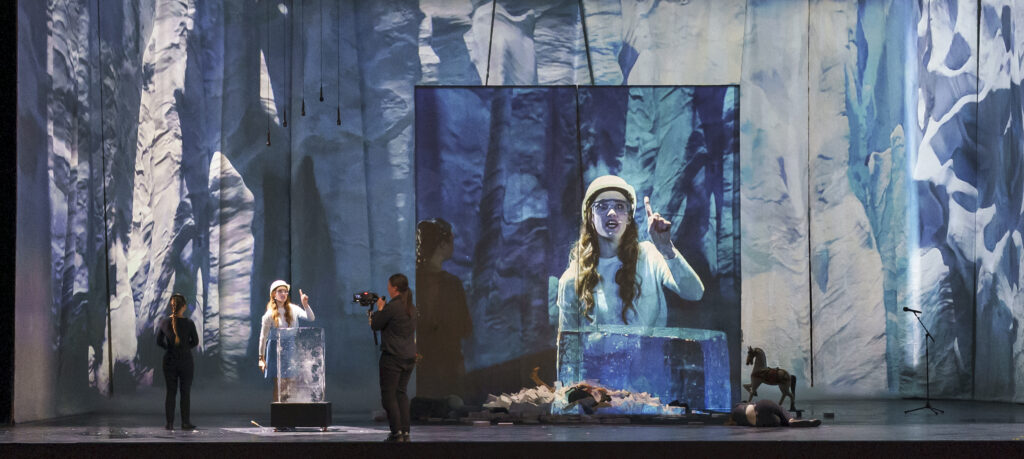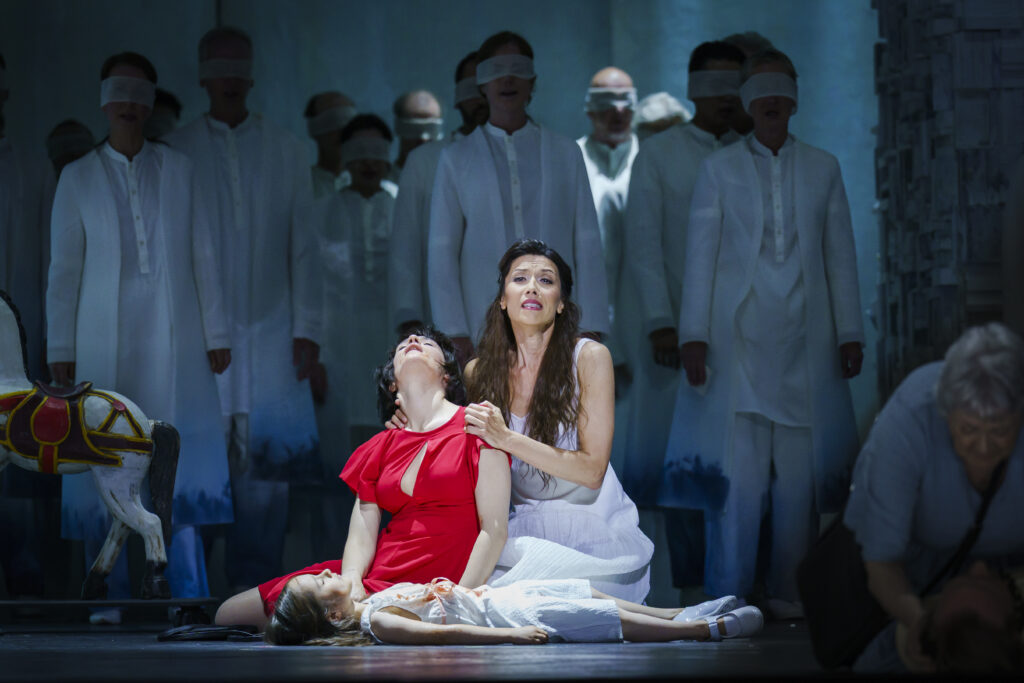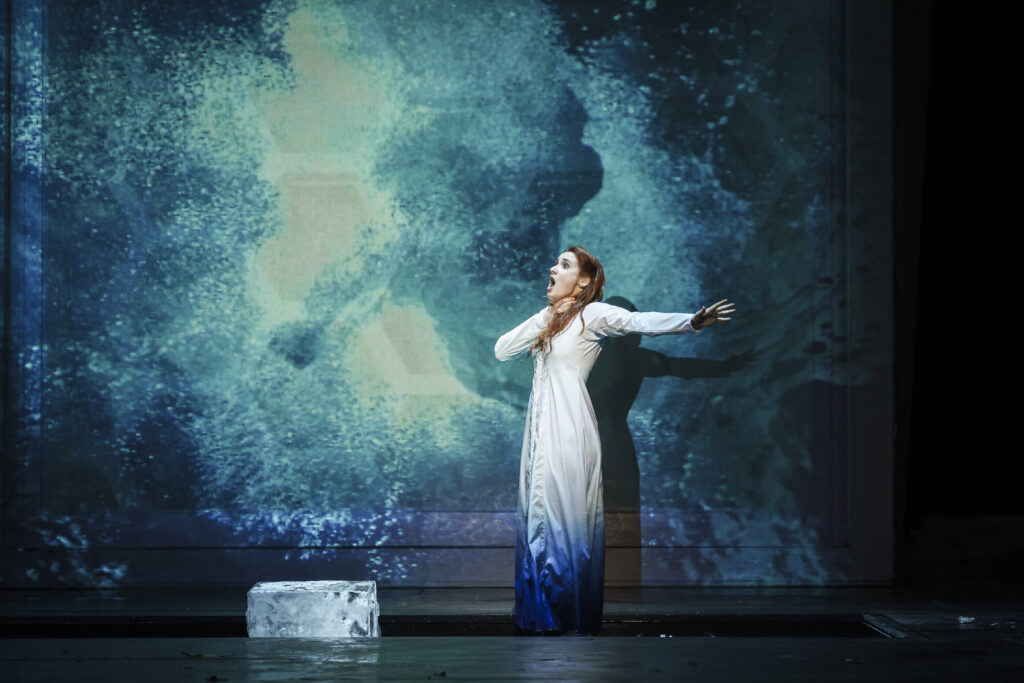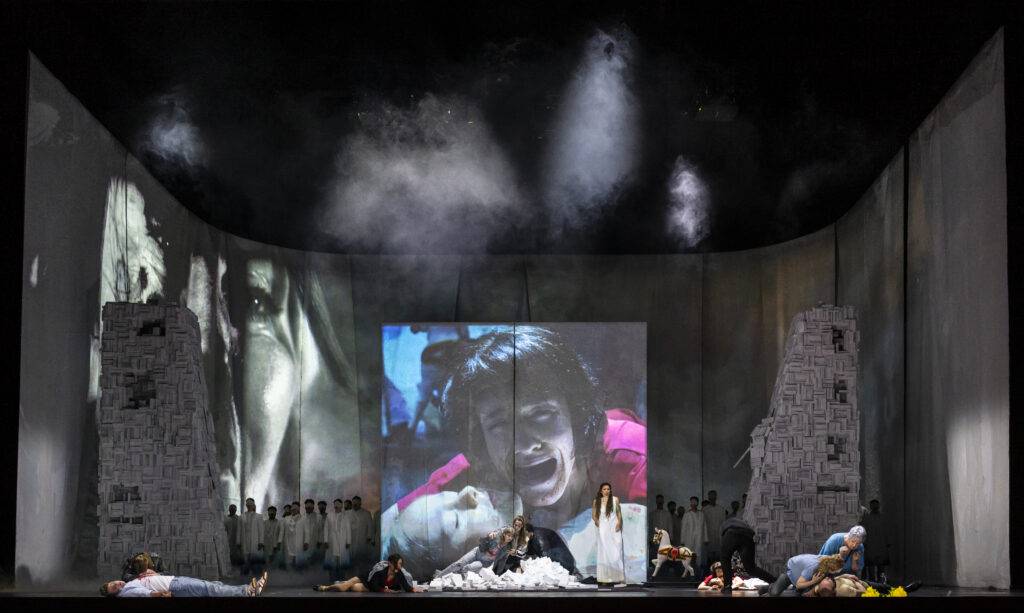The prologue brings a lot of noise to the stage – collapsing walls, then carnage and blood. The distant past, the present and looming future scenarios are linked in this first joint opera ‘Cassandra’ by Belgian composer Bernard Foccroulle (music) and Canadian Matthew Jocely (libretto).
The myth of Cassandra is the central theme. The prophecies of Homer’s Cassandra (Katarina Bradic), who predicts the downfall of ancient Troy in the battle with the Greeks, alternate with the warnings and predictions of climate researcher Sandra (Jessica Niles) in the 21st century. These two women share the same fate: their gloomy predictions are ignored by the people who have the power to avert the catastrophes. Both storylines – the fall of Troy and the debates about the causes and consequences of current climate change – merge repeatedly in the 13 scenes.
The video projections in the production (Marie-Eve Signeyrole) mesmerise the audience and are precisely coordinated with the music. They complement the stage design perfectly. At the centre of the set is a mobile cube that frames the action and is always changeable, divisible – functioning as an iceberg, bookcase, wall, shelf or honeycomb. Impressive details and constant changes of focus take the audience on a scenic journey. Especially as a live camera is used to project large-format excerpts of the performance.

The involvement of the audience is staged – the performance is constantly accompanied by contemptuous laughter, applause or even anger and criticism from the audience. This is linked to the role of Sandra, a stand-up comedian who tries to make herself heard by using humour to present her facts. Cassandra’s cry of ‘Ototoi Popoi da’, for which there is no translation and which Katarina Bradic impressively and full of horror utters when she looks into the future, is far from over.

The two women’s parents are each played by the same singers. They slip into different roles: In ancient times, they look back sadly on their fate and death as Cassandra’s parents, Hecuba and Priam. In contrast, their singing in the present is spiteful and mocking. Victoria (Susan Bickley) and Alexander (Gidon Saks) are rich people who want to profit from the exploitation of raw materials after the poles have melted. Sandra is not taken seriously by her parents. Her father keeps singing ‘Sandy’ in a belittling way.
Apollo (Joshua Hopkins) feeds on Trojan corpses and sexually harasses Cassandra. Sandra, on the other hand, has a man who is close to her. However, the relationship between climate activist Blake (Valdemar Villadsen) and Sandra (Jessica Niles) is fraught with problems. Both are doing research. Blake wants a child, Sandra doesn’t. Her voice is determined and convincing. She is self-determined and fears that her child would only experience the suffering of a world in decline.

Blake’s character is portrayed by the saxophone – he writhes, initially remains in the dark, then takes action and sets off on a voyage to Antarctica by ship. There he has an accident. At the same time, the birth of Sandra’s sister Naomi’s child begins – Sandra’s younger sister is her counterpart. She decides in favour of the here and now.
The chorus of ghosts connects the times and carries the audience through the play. Sometimes in the background, sometimes in the foreground. It also appears in the stands and thus re-establishes the connection to the audience. The bees symbolise the destruction of biodiversity. They are first depicted by video projections as a large swarm, audible through the violins. Later, the bees are only a small group. They are threatened with extinction.

The orchestra’s playing under the direction of Anja Bihlmaier corresponds perfectly with the video projections – the forces and sounds of nature are depicted – the ice melts. The marimba is used particularly beautifully in the scenes in the present.
Sandra and Cassandra come together at the end. They sing ‘Ototoi Popoi da’ together – both lone warriors find their counterpart from the other time. Unlike Cassandra, Sandra doesn’t give up – she never lets her voice be taken away from her. The audience in the packed Staatsoper Unter den Linden rightly applauds enthusiastically – the appealing accompanying booklet and the introductory discussion are also very successful.